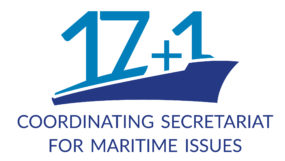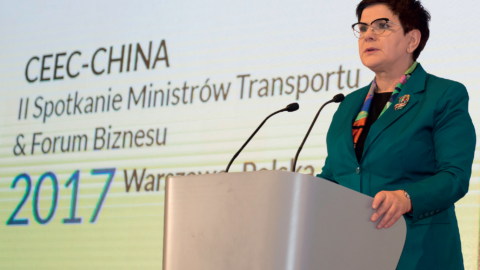I am truly glad that we have the pleasure of hosting Ministers, Ambassadors, Heads of delegations, members of Parliament in Warsaw during the CEEC – China 2nd Transport Ministers’ Meeting. Indeed, transport is one of the most prospective areas of cooperation between Poland and the entire Central and Eastern Europe and China. Your presence today also honours the official inauguration of the operation of the “16+1” Coordinating Secretariat for Maritime Issues.
The decision that the secretariat would be seated here, in Warsaw, was taken a year ago. It is a great honour and distinction for my government. We are greatly pleased that we have the chance to host an important secretariat responsible for such significant areas of the economy as the transport and maritime economy. We are also very pleased that the new ministry established two years ago under the direction of Minister Marek Gróbarczyk, namely the Ministry of Marine Economy, the youngest child in our Government, seems to be the most ambitious one, and is developing most quickly. Today, this success can be attributed to the efforts of Minister Marek Gróbarczyk and his entire team.
The heads of the “17” governments meet annually, similarly to the heads of depar tments of other state institutions. Last year I had a chance to participate in person in the 5th Summit of the Heads of Government of the “16+1” countries held in Riga. The decisions I have referred to earlier were taken during that summit. The platform of cooperation between Central and Eastern Europe and China, known as the “16+1” initiative, celebrates its 5th anniversary this year. Throughout this period, it has redef ined the relations of our region with the People’s Republic of China. New dialogue channels have been established that enable us to identify advantageous areas of cooperation. Never before has our liaison with China been so intense and multi-dimensional as it is today.
The Polish government has always supported and will support development, and therefore Poland wants to use the oppor tunities created by the “16+1” format even more ac tively. We want to develop cooperation for the benefit of our countries and citizens, and thus ensure the development of seaports, shoreline areas and waterways within our whole region. The European Union is the largest trade partner of China; the worth of bilateral trade has already amounted to 514 billion euros, and is still growing. Central and Eastern Europe is a gate of the European Union through which all products are transported by land from China to Western Europe and from Western Europe to China. Thus, the port infrastructure can be an interesting alternative for Western European ports.
In – case of Poland, the most important goal is to overcome the previous negligence in exploiting oppor tunities of fered by the North-South transport corridor. We are implementing an ambitious programme for developing and modernising the railway network, on which we plan to spend 16 billion euros b y 202 3. Our companies regularly transpor t goods. There is a regular connection between Chengdu and Łódź connec ting Poland with China, and the number of Chinese trains entering Poland amount s to a few hundred per annum. We cooperate with partners from Belarus, Germany, Kazakhstan, China, Mongolia and Russia in the domain of container transport between Europe and China. Polish ports beat records in terms of the transhipment of impor ted and exported goods. In Gdańsk exclusively, only in the first half of 2017, 18.5 million tonnes of goods have been transhipped, in Szczecin and Świnoujście – 2.5 million, and in Gdynia – 10.3 million tonnes.
Future prospects are very promising. Iresponse to the increase of the importance of the maritime economy, the Polish government has decided to build a Central Port in Gdańsk ; a port with deep-water terminals that will enable the handling of the largest ships operating on the Baltic Sea. Very systematically and consistently, we are rebuilding the Polish shipyard industr y that has been destroyed by our predecessors, as we are sure that this will benef it the Polish maritime transport potential.
Another ambitious plan of the government is to bring back navigability of the Vistula and Odra River s and to truly connect Polish rivers to the international waterway system. By investing in inland navigation, we invest in eco – friendly transport emitting low quantities of carbon. Polish ports will become one of the beneficiaries of the development of waterways. The Polish government aims at developing road, railway and air transport in Poland along wi th the maritime and river transport. This intermodality of transport is the key stone of today ’s meeting. In this regard it is worth mentioning the largest and most comprehensive Polish development programme, namely the Central Communication Port. The concept of a communication hub includes the construction of the largest airport in Poland and connecting it to the high speed railway network. The Central Communication Port will be an answer to the growing number of air connections between Europe and Asia.
The aforementioned projects constitute great development investments, and they have ground-breaking effects for our country. To conclude, I would like to express my wish that you will have fruitful and successful discussions, and I would like to invite you to the World Maritime Days that will take place in Szczecin in June 2018 as part of the annual Maritime Congress. All of these events are a great opportunity to continue our discussions on transport, especially maritime transport and inland navigation. I hope that you will have some time to see that Poland is a beautiful and dynamically growing country.
Beata Szydło, Prime Minister of Poland


 Albania
Albania Bosnia and
Bosnia and Bulgaria
Bulgaria China
China Croatia
Croatia Czechia
Czechia Estonia
Estonia Hungary
Hungary Latvia
Latvia Lithuania
Lithuania
 Montenegro
Montenegro Poland
Poland Romania
Romania Serbia
Serbia Slovakia
Slovakia Slovenia
Slovenia